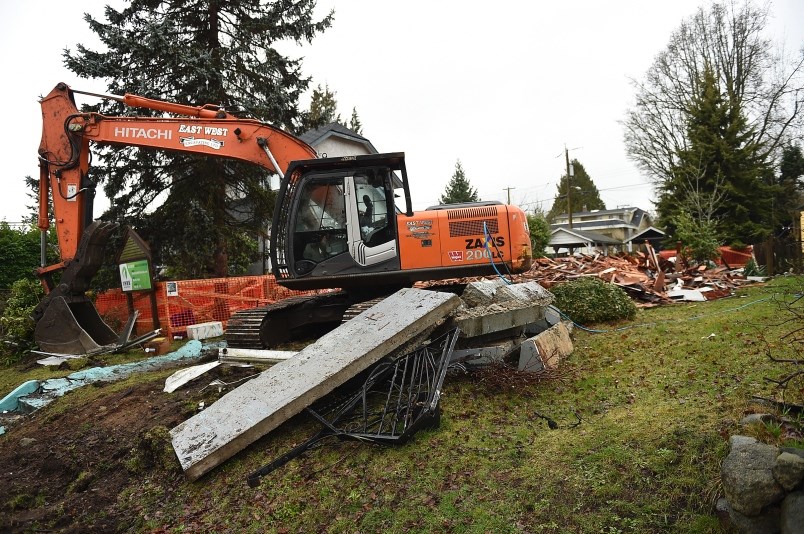I’ve got a small bet going with my neighbour. Another house just sold across our back alley. She’s betting it will be torn down. She gave me five to one odds. I bet a nickel it wouldn’t be.
In our neighbourhood, where tear-downs and reconstruction never seems to stop, this is what passes for entertainment.
Betting the city or the province will do anything about it? Well, you have got to be kidding.
The subject of our wager is a bungalow in great shape and with a basement suite. It sold for $2.67 million ($800,000 above the list price). The last house sold on the block previous to this one, sold a year ago for $1.8 million. That’s roughly a 50 per cent increase in house prices — or rather lot prices, on that one block in 12 months.
That jump in value inspired another owner who bought a house on the same block just over a year ago for $1.7 million; he intended to tear it down and build a new house but stopped in his tracks. He’s now put it up for re-sale. If things go as they seem to be going, he will make a million bucks just for, as one neighbour says, “doing nothing.”
This week’s report from the Canadian Real Estate Association should not come as a shock to any of us. Housing sales and prices hit new highs in Vancouver and Toronto. They also say there are indications that the market is peaking. Where have we heard that before?
Meanwhile, Mayor Gregor Robertson is once again declaring that the city is facing a housing affordability “crisis.” To fully appreciate just how much of a crisis we continue to face, a staff report to city council on Tuesday noted that Vancouver has the highest housing prices and rents and the lowest medium incomes of any major Canadian city.
But what has been happening to Vancouver house prices is now spreading up the valley. Places people used to go when they couldn’t afford to live here are no longer affordable havens. This week, we heard that year-over-year house prices in Surrey and Abbotsford increased more than 38 per cent.
Even one of the most seasoned veteran observers of the real estate industry has been shaken by this phenomenon. Economist Tsur Somerville, who holds UBC’s Real Estate Foundation professorship, admits he is in a quandary: “The world up to a year ago had a structure I understood,” he told me as he went on about a fixed supply and an excessive amount of demand. But not all prices should be escalating everywhere. It is “reflective of some kind of hysteria,” people panicking and rushing to get into the market — anywhere.
It does not help the affordability issue that the city’s zoning bylaws allow folks to tear down an 1,800-square-foot home and replace with it with a much more expensive 3,200-square-foot single-family dwelling.
As for the province intervening, Somerville observed that the premier “had to be dragged kicking and screaming” before she would even consider gathering data on foreign ownership and the impact it is having.
After all, the real estate boom and the massive amount of construction it is fostering, along with all the secondary industries that are benefiting, is what has British Columbia’s economy along with its low unemployment rate leading the country.
Finally, while it doesn’t significantly affect the overall price of real estate, there is the matter of the shenanigans of a relatively small group of unscrupulous and greedy real estate agents ripping off sellers by shadow flipping or failing to accurately report the source of funds from overseas clients. That behaviour, too, can be laid at the feet of the Liberals in Victoria.
While we await a report from B.C.’s Superintendent of Real Estate Carolyn Rogers, expected at the end of next month, there is something to consider.
Until 2005, the B.C. Real Estate Council was subject to a series of checks and balances and directly supervised by the superintendent. That year, Gordon Campbell’s Liberals stripped away most of those controls and made the council self-regulating.
As a result, the superintendent’s interventions regarding suspected wrong-doing became more difficult and rarely successful.
It will be interesting to see what Rogers recommends and how the Liberals respond.
@allengarr



